Global Issues

HILDA DE BOJORQUEZ holds a set of blueprints in one hand. Her other hand is pointing. At a better future, perhaps, if things go well.
De Bojorquez is the chief engineer at this construction site in a neighborhood just outside Port-au-Prince still blemished with rubble from Haiti’s 2010 earthquake. She commands respect from the all-male crew of Haitians working at the site—she tells a group of visiting U.S. reporters that her gender has never been an issue in the male-dominated world of construction, here or in her native El Salvador.
When asked about obstacles on the project, De Bojorquez goes on for 15 minutes—she’s an engineer, after all—but the point is that they’ve tackled them, one by one, and done so the right way. She extols the importance of a solid foundation and robust retaining walls. She points to the cinder blocks and the rebar, and explains how her group had to teach a company how to provide high-quality materials, with the promise that they’d buy everything the company made. And she emphasizes that she’s there not just to oversee a number of construction projects, but to train Haitians to do it themselves the next time—and to do it right.
The steel-reinforced blocks are rising into walls that will surround a new six-room school for perhaps 200 children in this neighborhood four miles east of Port-au-Prince. The narrow site is wedged between two crumbling buildings, both showing earthquake damage. Even to an untrained eye, the differences are obvious between the fragile, deteriorating blocks next door and the solid retaining walls rising at our feet.

Pope Francis nominated 15 new cardinals Jan. 4 from 14 different nations but leaving several leading U.S. archbishops off the list.
Speaking to a crowd gathered in St. Peter’s Square, the pontiff named each cardinal, noting they came from every continent and “show the indelible tie with the church of Rome to churches in the world.” At least three are from nations that have never had a church member in the role.
Five of the cardinals come from Europe, three from Asia, three from Latin America, and two each from Africa and Oceania.
The nations of Cape Verde, Tonga, and Myanmar received their first cardinals ever, Vatican spokesman Fr. Federico Lombardi said in a statement.

Coffee — a seemingly small thing — has become a hugely important part of my faith life. It has helped me create bonds with new people and strengthen those with individuals I've known for years. Coffee has helped me build a stronger sense of community in my church in a fun way while seeking to fulfill the word of God by supporting those less fortunate than myself.
How has coffee had such a profound effect on my life? For the past eight years, I have headed the Lutheran World Relief Coffee Project at my congregation, Christ Lutheran Church in Whitefish, Montana. When we buy Fair Trade products, we are assured that the farmers who grew them are getting a fair price, and a chance at a better life. Lutheran World Relief, an international humanitarian organization, offers Fair Trade coffee, tea, and chocolate to Lutheran congregations through a partnership with the Fair Trade company Equal Exchange. Every third week, I set up tables at church, where I sell Fair Trade coffee, tea, snacks and cocoa product to my fellow parishioners. I enjoy and flourish in this ministry for many reasons. Here are 10 of them.

The Church of England announced on Dec. 17 that Libby Lane, a parish priest from Hale, a small village outside Manchester, would become its first woman bishop, ending centuries of all-male leadership in this country’s established church.
The announcement from Downing Street, the prime minister’s official residence in London, came just a month after changes to canon law making it possible for women to assume the role of suffragan and diocesan bishops.
Lane, 48, a mother of two and the wife of an Anglican vicar, will be consecrated as the eighth bishop of Stockport, in the Diocese of Chester, at a ceremony at York Cathedral on Jan. 26. Her appointment is as a suffragan bishop — a bishop subordinate to a metropolitan or diocesan bishop.
On her surprise appointment, she said: “This is unexpected and very exciting. I’m honored and thankful to be called to serve as the next bishop of Stockport and not a little daunted to be entrusted with such a ministry.”

Major sporting events could be held at the Vatican if Rome wins its bid to host the Summer Olympics in 2024.
Pope Francis, a keen soccer fan, is reported to be enthusiastic about the idea. He is expected to meet the head of Italy’s National Olympic Committee, Giovanni Malago, and other officials at the Vatican on Dec. 19 after a Mass to commemorate the committee’s 100th anniversary
Cardinal Jose Saraiva Martins, former head of the Congregation for the Causes of Saints, said he believed Francis would back plans to hold events such as archery in the Vatican gardens.
He told the Florence daily La Nazione that events could also be staged at the pope’s summer palace at Castel Gandolfo outside Rome.
“It seems like a good idea, I think the pope will approve,” Saraiva Martins said.
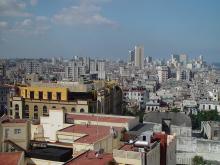
Alan Gross, the Jewish international aid worker held on alleged spy charges in Cuba for five years, was freed on Dec. 17 — what some are calling a Hanukkah miracle on the first day of the holiday that celebrates religious freedom.
Gross, 65, of Maryland, has always claimed that he only went to Cuba to bring communications equipment to the small Jewish community left in Havana. However, the Castro government said he was part of a spy network attempting to set up a secret network for Cuban Jews. Gross was serving a 15-year sentence.
President Obama chose the Dec. 17 release as a springboard to announce a massive historic “normalization” of U.S.-Cuba relations. Meantime, in Cuba, President Raul Castro, who held a press conference in Havana at noon, was expected to release 53 Cuban political prisoners.
Obama particularly credited the “moral example of Pope Francis,” who actively encouraged Gross’ release. Francis, who held private meetings at the Vatican to secure the deal, praised the move, sending “his warm congratulations for the historic decision taken by the Governments of the United States of America and Cuba to establish diplomatic relations, with the aim of overcoming, in the interest of the citizens of both countries, the difficulties which have marked their recent history.”
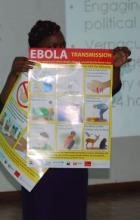
The government of Sierra Leone banned public Christmas and New Year’s celebrations because they may exacerbate efforts to eradicate the Ebola virus.
President Ernest Bai Koroma said that despite immense help from the international community, the number of people infected with the virus continues to rise.
Ebola infections in Sierra Leone recently surpassed those of Liberia and Guinea.
“The illness started at the border and now is in the cities and close to 2,000 people have died from the outbreak,” Koroma told reporters. He asked traditional leaders and tribal chiefs to quit performing rituals in hopes that will help curb Ebola.
The majority of Sierra Leone’s 6 million people are Muslim, but Christmas is widely celebrated among the 27 percent of people who are Christian.
Officials said soldiers will be deployed on the streets and people are advised to stay at home with their families.

The Vatican announced Dec. 11 that Pope Francis will name a new batch of cardinals in February, adding to the select group of churchmen who will someday gather to elect his successor.
Rome won’t reveal the names until next month, but could an American be among them?
There are a number of factors that will govern the choices, and thus the predictions:
First, there are 208 cardinals in the College of Cardinals, but at the age of 80 a cardinal is no longer allowed to vote in a conclave. That leaves 112 cardinals under the age of 80, as of now, though two more will age out in February and another two in March and April.
The customary ceiling on the number of electors today is 120 (it has changed many times over the centuries). That means that Francis could give a so-called red hat to 10 or 12 bishops.
The pope could also raise the ceiling, or ignore it, as Saint John Paul II often did during his long reign.
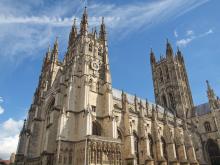
In a lengthy interview in The Times of London, Archbishop of Canterbury Justin Welby predicted that the Anglican Communion might not hold together because of strong disagreements on the ordination of women as bishops and full rights for LGBT people.
The candid interview came at the end of Welby’s visits to the 38 provinces (or country-states) that make up the Anglican Communion.
Welby said that although individual churches remain “strong, resilient and thriving,” the differences among them remain profound.
“I think, realistically, we‘ve got to say that despite all efforts there is a possibility that we will not hold together, or not hold together for a while,” he said. “I could see circumstances in which there could be people moving apart and then coming back together, depending on what else happens.”
Rod Thomas, chairman of Reform, an evangelical network of English and Irish Anglicans opposed to women bishops and LGBT ordination or unions, agreed with the archbishop’s assessment.
“If, as an Anglican, you believe more or less the same things but you just can’t reach agreement on something that is terribly divisive, you do go your separate ways. That will mean that the heads of various Anglican churches around the world won’t be able to meet together and say ‘Look, we’re all united’ in the same way they did in the past.”
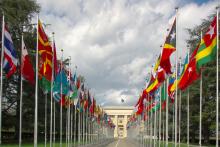
IN APRIL, THOUSANDS of people from across the United States and the world, joined by activists and A-bomb survivors from Japan, will flock to New York to demand that the nuclear powers fulfill their nuclear Non-Proliferation Treaty (NPT) obligations to negotiate a legally binding agreement to completely eliminate their nuclear arsenals.
The NPT Review Conference, held at the U.N. every five years, presents an important opportunity for the 189 signatory nations and for civil society to ensure that this treaty is implemented. The treaty rests on three pillars: 1) non-nuclear states forswear becoming nuclear powers; 2) all signatory nations have the right to generate nuclear energy for peaceful purposes (a serious flaw); and 3) the P-5 nations (U.S., Russia, Britain, France, and China) are obligated to engage in good-faith negotiations to completely eliminate their nuclear arsenals.
Forty-five years after the treaty went into effect, the P-5 have yet to fulfill their part of the bargain, leading to a loss of faith by a growing number of nations and the danger that some will opt out of the treaty to equalize the imbalance of nuclear terror. With the U.S. and Russia having engaged in nuclear war exercises during the Ukraine crisis, simulated U.S. nuclear attacks against North Korea, the U.S.-Chinese arms race, and India and Pakistan again at loggerheads, April’s review conference provides a critical opportunity to press for nuclear weapons abolition and to build the nuclear disarmament movement.

THE U.S. AND other nations are increasingly aware that the so-called Islamic State is a serious, long-term threat to Middle East stability. And it has become clear that there are few good options for addressing the situation without the willingness and ability of the Iraqi government to promote inclusion and weed out corruption.
In the midst of all this, the plight of Iraqi Christians has taken center stage. Since the U.S.-led invasion of Iraq in 2003, more than two-thirds of the Iraqi Christian community has left the country, with many fleeing as a result of violence and religious persecution.
This exodus has only increased as the reach of the Islamic State, or ISIS, has expanded and its reputation for brutality become widely known. The militant group has publicly beheaded hostages for propaganda purposes, committed mass killings, and given Christians the ultimatum: Convert to Islam, pay a fine, or face death if they remain faithful to their beliefs.
Followers of Christ have existed in the area now called Iraq since the earliest days of Christianity. Now there is a serious debate as to whether the faith has a viable future in this ancient of lands.

This week, at a conference in Vienna, Austria on the humanitarian impact of nuclear weapons, Pope Francis issued a statement declaring that "nuclear deterrence cannot be the basis for peaceful coexistence between states."
A Vatican official told Sojourners in Vienna that the Holy See is seriously discussing whether the possession of nuclear weapons can be morally justified in our current multipolar world. The official quoted Pope John XXIII, who said "Nuclear weapons should be banned," and said that the time has come to embrace nuclear abolition.
The Vatican statement, titled "Nuclear Disarmament: Time for Abolition," argued that "the structure of nuclear deterrence is less stable and more worrisome than at the height of the Cold War," and said that "the very possession of nuclear weapons, even for purposes of deterrence, is morally problematic."
Since the beginning of the Cold War in the aftermath of World War II, the fundamental moral rationale for the possession of nuclear weapons has been the concept of deterrence. Simply put, the threat of massive annihilation rendered these weapons unusable — the very threat of such unacceptable destruction would, in theory, deter their use.
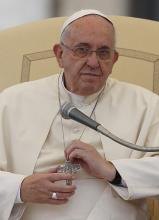
The 77-year-old pontiff is well-known for his attacks on consumerism and for his compassion for the poor. More recently, Francis has turned his attention to bioethics issues, describing abortion, embryonic stem cell research, and euthanasia as “playing with life” and “a sin against God.”
But this was the first time he has delivered his message on the floor of the parliament of the European Union, which represents 500 million people across 28 countries.
As the first non-European pope to hold the office in almost 1,300 years, Francis also appeared less willing to continue the Roman Catholic Church’s traditionally unconditional support for the EU.
As the impact of the stifling economic crisis is being felt in European countries like France and Italy, Francis attacked the EU for a dearth of leadership, saying its ideals had become weighed down by bureaucracy.
“The great ideals that inspired Europe seem to have lost their power of attraction, in favor of the bureaucratic, technical emphasis of its institutions,” the pope said.
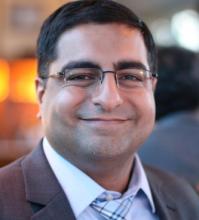
With each bloody act, Islamic State militants demonstrate their need for self-importance overrides any moral, ethical, or religious boundary. Peter Kassig’s beheading is a microcosm of all the Islamic State wants, and religion is not high on that list.
Kassig converted to Islam and took the name Abdul-Rahman, servant of the Merciful. By many accounts, his conversion was genuine and the result of the love he felt for the people he met while providing aid in Syria. His former military service could have made him reluctant to return to a region in conflict. Instead, he chose to go back and help people, risking his life to do so.
In comparison, the Islamic State exacerbates a worsening humanitarian crisis in Syria. It works to prevent aid workers like Kassig from doing their job. A broken population that has no hope is the best recruiting environment it can hope for. If Syrians get aid from Americans, it would destroy the narrative that Islamic State militants are caring for Muslims.
The Islamic State specializes in media manipulation. It uses videos of its executions to gain a response from more powerful adversaries, thus giving it more legitimacy. The world “Islamic” ties the group to something grander than political machinations and 15th-century wars. Its video game-style recruitment material exhibits a mastery of the language of modernity.
Ultimately, the group is a product of modernity, not religion.
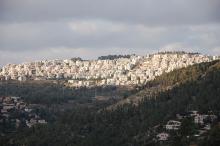
At least four worshipers, three of them U.S.-born, were killed in an attack on a west Jerusalem synagogue Nov. 18 by two Palestinians wielding a gun, an ax, and a meat cleaver, police said.
The incident was the latest violent event in the tense city where relations between Arabs and Jews have been deteriorating for months over a contested shrine holy to both Jews and Muslims.
Police spokeswoman Luba Samri said eight people were wounded in the assault, including police officers. Samri said the attackers were Palestinians from east Jerusalem.
One of the victims was Rabbi Moshe Twersky, 59, a native of Massachusetts, according to Haaretz. Aryeh Kupinsky and Kalman Zeev Levine, 43 and 55, respectively, were also U.S.-born. Avraham Shmuel Goldberg, 68, was born in England.
The attack took place in the Jewish neighborhood of Har Nof in the western part of the city. The attackers were shot and killed by police following a shootout. Police were searching the area for other suspects.
The Abu Ali Mustafa Brigades, the military wing of the Popular Front for the Liberation of Palestine, claimed responsibility for the attack, according to the BBC.
Yosef Posternak, who was at the synagogue at the time of the attack, told Israel Radio that about 25 worshipers were inside when the attackers entered.
“I saw people lying on the floor, blood everywhere. People were trying to fight with (the attackers) but they didn’t have much of a chance,” he said.

ISIS terrorist rampages, waves of anti-Muslim hate speech and fear-mongering Islamophobia are inspiring an outburst of online activism in the form of Twitter hashtags.
The question is: Does it work, especially over the long term?
An army of “clicktivists” — a mix of earnest advocates and pointed satirists — has entered the fray armed with 140-character positive, peaceful or humorous counter-messages.
Using names such as #TakeOnHate, #IStandUpBecause, and #NotInMyName, the pushback approach promotes the complexity, diversity and positive contributions of Islam and Muslims. Others, such as #MuslimApologies, offer sarcasm in service of the same message.
Yet the hashtags are often immediately co-opted by trolls spewing an opposite message. And some experts question whether clicktivist campaigns have lasting worth.
Linda Sarsour has no doubt they do. She’s a Brooklyn-based Palestinian activist in the streets and on social media and a co-creator of #TakeOnHate. The hashtag is accompanied by a resource website, launched in March by the National Network for Arab American Communities.
“The insidious thing about anti-Arab hate speech is that it seems to be acceptable, where the ‘N-word’ or anti-Semitic remarks are not taken with the same degree of outrage,” said Sarsour, who was chased down the street in September by a man who was later arrested for threatening to behead her.

The Temple Mount – Haram al-Sharif to Muslims – in Jerusalem is at the center of an intense debate over messianic religious Zionism in Israeli politics and society, and what it means for the future of the peace process. Religion News Service photo by Jabeen Bhatti
It’s a site holy to both Jews and Muslims — considered the most religiously sensitive square kilometer on earth.
These days, the Temple Mount — known as the Haram al-Sharif to Muslims — is at the center of an intense debate over messianic religious Zionism. How Israeli society deals with it may hold the key to the peace process.
Temple Mount tensions were sparked by last month’s attempted assassination of U.S.-born Rabbi Yehuda Glick, who was seriously wounded.
Glick is a fierce advocate for building a third Jewish temple on the site of the Temple Mount, where two Jewish temples stood thousands of years ago. He is also at the forefront of a campaign to allow Jewish prayers at the site. Israel currently bans Jews from praying on the plateau to prevent clashes with Muslims worshipping at the nearby Noble Sanctuary, a mosque considered to be Islam’s third-holiest site, and Jerusalem’s most iconic gold-domed landmark.

Pope Francis on Nov. 11 created a new Vatican body to deal with the most serious cases of child sexual abuse and to streamline complaints against the clergy.
The Vatican said the pope would nominate seven cardinals or bishops to consider appeals from clergy accused of abusing minors in a bid to speed up the judicial process of clergy who have received an initial assessment by local bishops.
The members of the panel, or “college,” may come from the Congregation for the Doctrine of the Faith, which currently handles cases, or elsewhere in the church. Members will also be asked to deal with serious abuses of penance in the confessional.
The Vatican’s chief spokesman, the Rev. Federico Lombardi, called the pope’s proposal a “good solution” to help alleviate a backlog of cases.
Bishops accused of sexually abusing minors will still have their appeals handled by a session of CDF members at their monthly meetings.
“This is a good sign Francis is giving: He is basically saying that the CDF remains competent, and gives them an extra instrument to promptly deal with a specific type of appeals against decisions, namely recourses against administrative decrees,” said Kurt Martens, a canon law expert at Catholic University in Washington.
The immediate changes were outlined in a papal rescript, or “Rescriptum,” signed by the Vatican secretary of state, Cardinal Pietro Parolin, and printed in L’Osservatore Romano, the Vatican’s official newspaper.
The pope has adopted a hard line on clerical sex abuse and at times asked for forgiveness while lambasting church leaders more than once for protecting abusers.
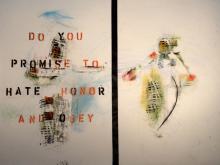
While the world’s attention is firmly fixed on the Islamic State’s continued rein of terror, applause for Malala Yousafzai — for taking home the Nobel Peace Prize — has taken on a quieter tone. Yet, her message — that girls can turn the tide against religious radicalism and repression — risks being lost.
In another part of the world, reports continue to trickle in of the failed negotiations between the Nigerian government and Boko Haram — negotiations that were supposed to include provisions for release of the more than 200 Nigerian schoolgirls who remain firmly within Boko Haram’s grip. In fact, there are new reports that another 20 to 70 women and girls have become the latest victims of Boko Haram’s terror, threatening the cease-fire that was to bring the original schoolgirls home. Moreover, much of the world is now eerily silent on the subject — calling into question the commitment to the return of the girls and undermining the separate campaign to improve the education of girls worldwide.
Is this Malala’s world? One where the value of female lives is an open question, and where the kidnapping of girls and women by terrorists goes unanswered? It certainly seems that way. The #bringbackourgirls campaign championed by first lady Michelle Obama and countless Hollywood stars is now a stagnant memory.
Compare this reality to the global push to educate the girls, an understood foundation for economic development and prosperity, with the paradox of the wholesale abandonment of the abducted girls, whose only crime was receiving this exact education.

LAST YEAR, as I was unpacking my son’s school backpack, I found the children’s book on the Prophet Muhammad that my wife and I read to him at night. He had brought it to school without telling us. “It was for show and tell,” he explained to me.
You might think that my first reaction would be happiness. One of my goals as a Muslim parent is to help my kids feel connected to their faith. Clearly my son felt close enough to his religion to bring a book on the Prophet to share with his class.
What I actually felt was a shock of fear shoot down my spine. It was an immediate, visceral reaction. A whole slew of questions raced through my head. What did his teacher think of Muslims? What about his classmates? Would somebody say something ugly or bigoted about Islam during my son’s presentation? Would his first taste of Islamophobia come at the age of 5 during show-and-tell?
My fear at that moment is one small window into what it feels like to be a Muslim-American parent at a time when Muslim extremism is on prominent display and Islamophobia in America continues to spread.